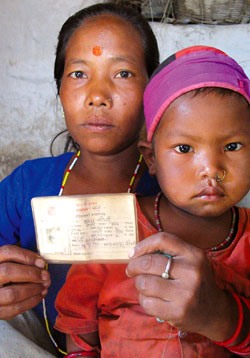|
|
Human rights defenders in Nepal have documented case after case of serious breaches of human rights and humanitarian law. The state and insurgents have encroached on non-derogable rights, and victims and their families are seeking justice.
The task after Jana Andolan II is dealing with impunity, or 'getting away with it'. Transitional justice, as part of a major political transformation, helps exorcise legacies of human rights abuse, mass atrocity, and other forms of severe social trauma, such as civil war.
The process could take many forms, such as creating a high-level commission to investigate and establish of as complete a picture as possible of the nature, causes, and extent of rights violations during the conflict period. For reconciliation and restructuring, victims need an opportunity to relate to the violations they suffered, and should be able to expect reparations and restored human and civil dignity.
Judicial and non-judicial strategies include prosecuting perpetrators, establishing a truth commission or investigation into the past, efforts toward reconciliation, and reparations packages for those most affected by violence or abuse. Abusive state institutions (security services, police, or military) need to be reformed to prevent future violations. New policies of justice must come with support from victims and the public, and consultation with civil society.
Often, government officials grant amnesty to individuals responsible for rights violations, saying their actions were inevitable while 'maintaining law and order'. Amnesty is assumed to help a stable transition from conflict to peace, but often has a boomerang effect on securing lasting peace and respect for human rights. Countries like South Africa, Peru, and Morocco have undertaken the complex task of restorative justice, showing that it is not necessary to choose between peace and justice. There is no one-size-fits-all solution for unique historical experiences.
Effective transitional justice requires a mapping of social, political and economic ground realities, and auditing of popular sentiment. The question is not whether justice will be pursued, but when and how. The International Criminal Court is available to provide backup when national courts are unable or unwilling to take legal action against the chief architects of mass atrocities.
Those against international involvement say prosecution by outsiders has a destabilising effect. However, domestic initiatives are sometimes weak, political will and institutional capabilities inadequate. The independence and integrity of domestic prosecutors and judges are questionable when a dictatorial regime has reigned brutally and for so long. International assistance helps through legal expertise and political negotiation to establish a due process of law to indict suspects.
Fair trials are an essential component of transitional justice, but national laws can have principles, like the death penalty, not concordant with international law. 'Forgetting and forgiving' is a real danger. Consider the impunity report prepared by the 1991 Mallik Commission. Successive democratic governments didn't care enough to implement the report's findings, which resulted in the same old perpetrators coming to power 15 years later, and committing even more serious crimes.
Reform in old establishments is essential to generate faith in new ones. It is not possible to find every disappeared person, nor to prosecute every guilty one. Given this, we must aim for understanding not vengeance, reparation not retaliation.
Gopal Krishna Siwakoti is president of INHURED International.




